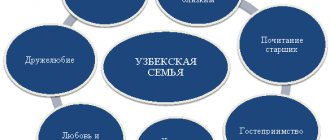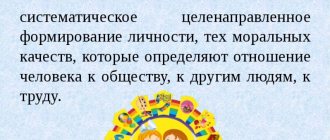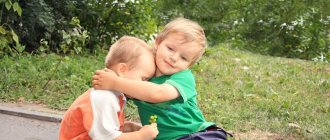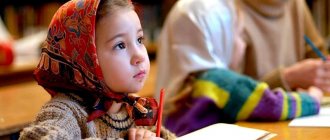The concept and content of spiritual and moral education
Definition 1
Spiritual and moral education is a purposefully organized pedagogical process of assimilation and acceptance by students of cultural, spiritual and moral values.
The essence of spiritual and moral education lies in the consistent expansion and strengthening of the value sphere of the child’s personality, the formation of his ability to find, see, perceive and evaluate beauty on the basis of cultural and moral norms and traditions.
Main directions of spiritual and moral education:
- Fostering love for the Motherland, developing patriotism, respect for the rights and freedom of every person.
- Education of aesthetic consciousness and moral feelings.
- Fostering hard work, a positive attitude towards work, learning and life.
- Formation and development of a value-based attitude towards a healthy lifestyle, one’s health, love and respect for family, nurturing family values.
- Fostering a respectful and valuable attitude towards the surrounding world, nature, and native land.
- Cultivating a value-based attitude towards aesthetically beautiful things, forming ideas about ideals and values.
Are you an expert in this subject area? We invite you to become the author of the Directory Working Conditions
Principles of spiritual and moral education:
- the principle of personal moral example;
- the principle of socio-pedagogical partnership between all participants in the educational process;
- the principle of individuality in education;
- the principle of integration of educational programs;
- the principle of relevance and relevance of education.
“Spiritual and moral education - as the basis for the harmonious development of a student”
• Secondly, in
the modern world, a small person lives and develops, surrounded by many different sources of strong influence on him, both positive and negative, which daily fall on the child’s fragile intellect and feelings, on the still emerging sphere of morality.
• Thirdly , education in itself does not guarantee a high level of moral education, because education is a personality quality that determines in a person’s everyday behavior his attitude towards other people on the basis of respect and goodwill towards each person.
• Fourthly , equipping with moral knowledge is also important because it not only informs the child about the norms of behavior established in modern society, but also gives ideas about the consequences of violating norms or the consequences of this act for the people around him.
The moral education system includes:
• Firstly, understanding and taking into account in the work all sources of moral experience of students. Such sources are: activities (educational, socially useful), relationships between children in a team, relationships between students and teachers and parents, aesthetics of everyday life, the world of nature, art.
• Secondly , the correct balance between forms of activity and education at different age stages.
• Thirdly , the inclusion of moral criteria in the assessment of all types of activities and manifestations of the personality of children without exception. The thing is that education is just a side effect of interaction, deep communication between people, only this gives the effect of education, everything else is the child’s self-adaptation and self-determination. It is not the teacher, not the parents who raise the child, but the child adapts to the behavior of the parents and also adapts to the life situations that make up his life path.
Main sources of moral experience
This is, first of all, an educational activity. The moral development of students in the classroom is carried out through the content of program and didactic material, and the organization of the lesson itself. Educational material, especially in literature and history, has enormous potential for moral influence on schoolchildren. It contains a large number of moral and ethical judgments. During the lessons, the teacher directly leads students to understand their relationship to man and society.
WITH
The personality of the teacher has a strong influence on the moral development of schoolchildren in the learning process.
Each lesson the teacher implements certain goals, and not only those formulated in the plan. The teacher’s behavior, his gestures, his manner of dressing and speaking are reflected in the child’s mind; the nature of communication with him, with other students, under various circumstances; how he behaves with colleagues, how he reacts to the successes and failures of his classmates. The educator or teacher requires students to be careful, disciplined, and to fulfill their duties. And the result will depend on how demanding and consistent the teacher turns out to be. With skillful organization of both educational and extracurricular activities, students develop the foundations of moral behavior and spiritual culture.
Spiritual and moral education of the 17th – early 20th centuries
The era of Peter the Great (1682-1725) changed views on education. In a relatively short period of time, the foundations of a national education system were created in Russia. Before Peter I in Russia, a person was assessed by belonging to one or another class; under Peter I, personal achievements and services to the Fatherland became significant for the first time.
During the era of Peter I, new ideological guidelines began to form in society. Teaching etiquette, foreign languages, and familiarity with Western European fashion influenced the lives and consciousness of people. The worship of everything “foreign” could not but influence the change in approaches to the education and training of young people. In the XVIII. Century in Russia the first educational associations are formed. In the 19th century, various pedagogical projects for the creative, free education of the younger generation were implemented.
The experience of family education became the soil on which the first pedagogical theories “grew”. At first, they did not emphasize the specifics of family upbringing, but used the experience of family upbringing to draw general pedagogical conclusions.
With the advent of public education, the problem of the relationship between family and school in the overall process of education arose. It was solved in different ways - depending on the dominant social system, the philosophical and socio-political views of the thinker or practical teacher. Thus, according to Quintilian, the theorist of oratory in Ancient Rome, public (school) education has more advantages compared to individual (home) education. He wrote: “He who was brought up in solitude will be blinded by the bright shine of the sun and will not find any news for himself when he enters life with his knowledge.”
He identified four stages of development of the new generation (infancy, adolescence, youth and manhood) and outlined a six-year period of education (six-year school) for each stage; he said that a child's school is a mother's school in every family. Ya.A. Comenius put forward a system of ideas related to the recognition of the great gifts in the child’s nature: the natural attraction to light, to knowledge, to goodness, and defined the role of education as helping the child in the process of growing up. This desire to penetrate into the nature of the child was expressed by him in his definition of the principle of “naturalness.”
The 17th-century English philosopher Locke was a staunch supporter of individual education in the family under the guidance of governesses. The main goal of education, according to Locke, is virtue, the education of a moral person. But this cannot be achieved in school: School is a “branch of society,” and society is such that it educates immoral people. Therefore, Locke resolutely insists that education does not take place in school, but in the family, where an intelligent and virtuous teacher can raise the same “gentleman.” This argument is Locke's sober assessment of modern society and the utopian dream of raising moral people in an immoral society. Locke's pedagogical ideas about revealing the child's natural abilities had a great influence on the history of pedagogical thought. For him, a child is like a blank slate, that is, a child can perceive everything that experience brings. From these thoughts, as a consequence, arose the belief in the exclusive influence of the Lockean school.
Historical aspects of spiritual and moral pedagogy
The development and establishment of the education system in any state is closely connected with its history. Historical periods in the development of states are characterized by certain views on the education and upbringing of children, the possibilities of the educational process, the needs of society for educated and trained people, and, finally, the state of the state education system.
Analysis of historical and archival documents, legal documents in the field of education, regulatory, journalistic and artistic sources allows us to talk about family and home education as a complex educational process determined by the changing social, sociocultural and economic situation in the country.
Since ancient times, people have created their own pedagogy, preparing children for practical activities, for the struggle of life with the help of a variety of educational means.
With the advent of the family, family education became practically the only form of education for children in society for many millennia; schools and other educational institutions were few in number and served a small proportion of children, mainly from the privileged classes. The class character of society determined the different content and direction of family education in different social groups.
In the education system developed in Athens in the 7th-5th centuries. Century BC family upbringing and education took a dominant position. Unlike the Spartan education system, which was state-owned, in Athens children under 7 years of age were in the sphere of family education. For girls, in accordance with the position of women in a slave society, there was only a home education system. In addition to the traditional basics of literacy (reading, writing, counting), they were taught to play musical instruments, home economics, needlework and sewing.
Many principles of the Spartan and Athenian educational systems were further developed in Rome (6th century BC). As in Athens, boys were raised and educated until the age of 7, and girls even later, under the supervision of their mother or older relatives, who were responsible for their education. From the age of 7, boys began to study, usually under the supervision of their fathers. Education had a purely practical purpose - to prepare the child for social, military and economic activities in those forms that were dictated by the social status of the family. Thus, in addition to reading, writing and arithmetic, which were taught to everyone, the son of an artisan or peasant was prepared to work on his father’s farm; the son of an aristocrat learned to wield weapons, swim, ride a horse, learned something about the management of Ancient Rome and learned to manage agricultural work on his father’s estate. The main feature of Roman education and upbringing was its pronounced civic character. The main goal was to educate an active member of society, capable of sacrificing himself for the sake of family and state, a brave soldier who despises everything foreign, a skillful politician and a prudent landowner. In subsequent centuries, this system was largely preserved, only a few changes were made: The education of children began to be entrusted to slaves, and specially invited teachers were involved in their upbringing.
Family is one of the main themes of ancient Russian literary and pedagogical monuments of the 14th century. and domestic collections of the 14th century. The pedagogical thought of Ancient Rus' was clearly manifested in the “Instructions for Children” by Prince Vladimir Monomakh, in such literary and written monuments as “Bee”, “Prologues”, “Chrysostom”, etc. In the understanding of ancient Russian authors, the true wisdom of family education is associated with high morality, with Christian virtues.





